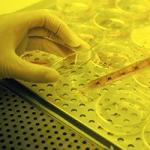
Research Topics
Overview
The goal of our group is to develop and exploit carbohydrate-binding antibodies as research tools, diagnostics, and therapeutics for cancer. We focus in several areas: 1) creating new strategies to discover and evolve anti-glycan antibodies, 2) studying endogenous carbohydrate-binding antibodies, and 3) investigating anti-glycan antibodies as potential diagnostics and therapeutics, and 4) developing new technologies for profiling glycosylation on cells and tissues, especially for discovering new cancer biomarkers. To facilitate these studies, we have developed a carbohydrate microarray, or glycan array, that allows high-throughput analysis of antibody binding properties and profiling of serum anti-glycan antibody populations. The array has over 900 array components, including a diverse collection of glycans, glycopeptides, and natural glycoproteins. Our array is unique in that we use multivalent neoglycoproteins as our primary array components. This format allows us to readily translate array results to other applications and affords novel approaches to vary glycan presentation.
Monoclonal Antibodies to Carbohydrates
Anti-glycan antibodies have significant potential for cancer applications such as diagnostics and therapeutics. Unfortunately, there are relatively few good carbohydrate binding antibodies available for the community. The lack of antibodies is a major problem for basic research in the field of glycobiology and limits antibody-based diagnostics and therapeutics. We have been taking a multipronged approach to improving access to carbohydrate binding antibodies. We study how the immune system constructs and evolves glycan binding antibodies, develop new strategies for engineering glycan-binding antibodies, and study basic principles of antibody-carbohydrate recognition. We also use our microarray to obtain new monoclonal antibodies with high affinity and selectivity for a variety of applications. Lastly, we have developed a database of glycan binding antibodies and reagent lectins, called Database of Anti-Glycan Reagents or DAGR, https://ccr2.cancer.gov/resources/Cbl/Tools/Antibody/). DAGR provides a unique resource where researchers can locate antibodies of interest and find information about those antibodies.
For a brief overview and rationale by postbac Claire Brown, see:
Antibody Responses to Vaccines and Other Immunotherapies
We have a long-standing interest in understanding the roles of anti-glycan serum antibodies in the treatment of cancer. We are especially interested in studying antibody responses induced by cancer vaccines and other immunotherapies. We have evaluated responses by whole cell vaccines (e.g.GVAX Pancreas), poxvirus-based vaccines (e.g. PROSTVAC), and carbohydrate-based cancer vaccines. These projects are shedding new light on how cancer vaccines and other immunotherapies work and are uncovering new biomarkers for precision medicine.
Glycan microarray technology
We rely heavily on glycan array technology to study immune responses to carbohydrates, and we continually strive to improve this technology. First, carbohydrate-protein interactions often involve formation of multivalent complexes. Therefore, presentation is a key feature of recognition. We have developed several new approaches to vary carbohydrate presentation on the surface of the array, including methods to vary glycan density and neoglycoprotein density. Second, we use synthetic organic chemistry to obtain a diverse set of tumor-associated carbohydrates and glycopeptides to populate our array.
Collaborations and Carbohydrate Microarray Screening
We are frequently asked to screen lectins, antibodies, and other entities on our array. Although we are not a core facility and do not provide screening services per se, we are happy to collaborate on many projects, especially those related to cancer. Please contact Jeff Gildersleeve for more details.
Antibody Database/DAGR
The Database of Anti-Glycan Reagents (DAGR) is a community resource to help researchers identify carbohydrate-binding antibodies and lectins. The DAGR website can be used to search for antibodies and lectins, find information about antibodies/lectins, and add new antibodies/lectins to the database.
The Database of Anti-Glycan Reagents can be found at the following link:
Biography
Jeff Gildersleeve obtained his B.S. degree in biology from the University of California at San Diego. He obtained his Ph.D. degree in organic chemistry at Princeton University under the guidance of Professor Dan Kahne, and completed postdoctoral training with Professor Peter Schultz at The Scripps Research Institute. He began his independent career at the National Cancer Institute in 2003 and is currently a Senior Investigator in the Chemical Biology Laboratory. The Gildersleeve group uses chemical approaches and glycan microarray technology to design and develop new carbohydrate-binding antibodies as research tools, diagnostics, and therapeutics. Dr. Gildersleeve is a recipient of the 2006 NCI Director’s Innovation Award and the 2011 David Y. Gin New Investigator Award from the Division of Carbohydrate Chemistry of the American Chemical Society. He also serves on the Scientific Advisory Board of the Canadian Glycomics Network, as a reviewer for various grant agencies and journals, and on Faculty Opinions (Faculty of 1000).
Selected Publications
- Muthana SM, Gulley JL, Hodge JW, Schlom J, Gildersleeve JC. ABO blood type correlates with survival on prostate cancer vaccine therapy. Oncotarget. 2015;6(31):32244-56.
- Campbell CT, Gulley JL, Oyelaran O, Hodge JW, Schlom J, Gildersleeve JC. Humoral response to a viral glycan correlates with survival on PROSTVAC-VF. Proc Natl Acad Sci U S A. 2014;111(17):E1749-58.
- Park S, Gildersleeve JC, Blixt O, Shin I. Carbohydrate microarrays. Chem Soc Rev. 2013;42(10):4310-26.
- Campbell CT, Gulley JL, Oyelaran O, Hodge JW, Schlom J, Gildersleeve JC. Serum antibodies to blood group A predict survival on PROSTVAC-VF. Clin Cancer Res. 2013;19(5):1290-9.
- Zhang Y, Muthana SM, Farnsworth D, Ludek O, Adams K, Barchi JJ Jr, Gildersleeve JC. Enhanced epimerization of glycosylated amino acids during solid-phase peptide synthesis. J Am Chem Soc. 2012;134(14):6316-25.
Related Scientific Focus Areas



Molecular Biology and Biochemistry
View additional Principal Investigators in Molecular Biology and Biochemistry
This page was last updated on Thursday, October 31, 2024